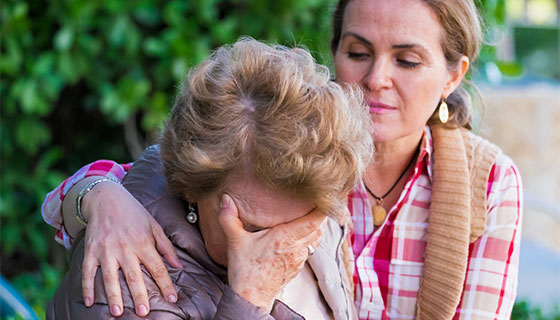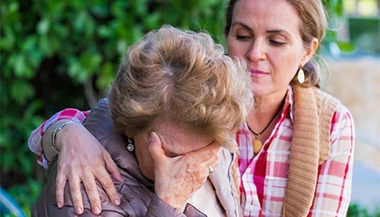Coping with Loss
You’ve just left a great retirement party and can sleep in for the first time in 40 years. Or maybe you just sold your house for an empty-nester’s dream condo. So why are you feeling so down? While we expect to feel a sense of loss from such events as divorce and illness, any major change means saying good-bye to something that’s been part of your life for a long time.
“While you may describe certain life events as changes, what you are really dealing with here is loss,” explains Michelle Carlstrom, LCSW-C, senior director at the Office of Work, Life and Engagement at Johns Hopkins. “As we get into the final chapters of our lives, experiencing loss becomes a frequent reality.”

While loss and grief can occur at any age, at midlife and beyond you may find yourself facing more changes with more finality—from leaving employment to attending funerals, from having an empty nest to just longing for your youth. But certain steps can help you cope healthfully, Carlstrom says.
Don’t fake a smile.
If you are having trouble coping with a big change in your life, don’t isolate yourself and pretend everything is OK. Pushing those feelings aside is not only ineffective, it will set you up for a lot of heartache. “Major life changes, even if they are for the best, can still leave a hole in your heart,” warns Carlstrom. “You may feel like you could go shopping or drink away the pain, but at the end of the day, it doesn’t fill up that hole.”
Grieve what you have lost.
“Although people in our culture are uncomfortable with conversations about grief, you have to acknowledge and grieve your losses,” says Carlstrom. Think back to your very first encounter with loss—how did you react? Did you stifle your tears and push the hurt aside? As adults, we tend to still rely on coping strategies that developed in our formative years, but we may now need to relearn how to cope in ways that match who we have become.
Explore your grief.
So what can you do to ease the pain of the losses left behind from change? Embrace the pain and explore the grief. If friends ask how you are doing, don’t just say, “Everything is fine.” Admit that you are struggling. Seek a support group. Speak to a grief counselor. Meditate on how you feel about what you have lost. And realize that losing something doesn’t have to signal an end. “Grief and loss enable you to understand your life in a new way, and that changes the way you see yourself in the world,” says Carlstrom. “Ends are also transitions to new experiences.”
Part of the problem is that we tend to associate the words loss and grief with death only. But every person is a griever of something, and there is absolutely nothing wrong with being a griever. “Grief experienced will dissolve, while grief unexpressed will last indefinitely,” says Carlstrom.
Research Shows Expecting Change Can Help
A simple way to cope with change as you age is to adjust your expectations. When British researchers compared life satisfaction among young adults and retirees, they found that adults who underestimated the likelihood of negative events in their life were unhappier. Anticipating some degree of change in life may help scale your expectations and improve your capacity to cope.





